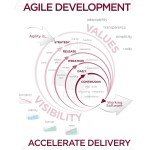Agile Mindset for Your Startup
I got to share the stage with the other half last week at Harvard Innovation Lab, when Jeffrey Beir & I took turns presenting dueling views on building your startup. Myself from the product perspective, Jeffrey from the investor’s viewpoint.
While we had clearly different opinions, one thing we both agreed on was that if you’re going to do a startup, you‘d best be agile about it.
Agile Principles
I kicked things off with the key principles that we see helping us to be smarter about how we build our businesses:
Iterate. In agile we talk about working incrementally (a little at a time) and iteratively (being okay with taking a couple of passes to get it right). There’s this notion of Wicked Problems – the idea that a problem is so complex, you can only fully define it by solving it.
We get this in software – where we often have to actually write the code before we know the right way to code it. Starting a company is like that too. We start with an idea of what we want to do, but it’s almost impossible to know the right way to execute until we actually… well, start executing.
Learn. And so we place a really high value on learning. The best way to learn? Just get something out there! Even if it’s totally wrong, we can still learn a lot from that. The next time we put something out there it will be a little less wrong… and so we keep going and honing in on the right way to operate.
Defer Decisions Until the Last Responsible Moment. Sure, it feels comfortable to feel like we’ve worked out all the answers up front and so know where we’re going. But that’s a false sense of security when we’re learning so much every day. I think agile is about being OK with being a little uncomfortable. And recognizing that next month we’ll know so much more than we did today, so if we don’t have to decide on something until then, defer it.
Deliver Fast. Instead, use your time and energy today delivering. Agile says “deliver fast”. If we know there’s a high probability we’re going to get some things wrong, then it makes sense to get something out there quickly so we can get that feedback and learn from it.
Eliminate Waste. How do we operate at the speed of a startup? We can work longer hours, add more people, push ourselves to work faster faster faster… OR, we can just stop doing all the crap that doesn’t matter today. I vote for the latter.
Agile Mindset Framework
Next, we laid out a framework for thinking about how we build our businesses and we each gave our two cents…. which, as it turned out, didn’t end up being all that far apart. Should I be maybe just a little bit afraid?
Vision. You want to start with your Big, Inspiring vision for how you’re going to change the world. The very best visions aren’t built around some current technology or trend but rather around a timeless vision of what they want to do for their customers. Twitter’s vision, for example, has nothing to do with tweets or apps: “To be the pulse of the planet.”
Focus. Then, you need to step back and figure out how to focus that down to something you can execute on. You actually need to go small, before you go big. Minimum Viable Product, Minimum Viable (Customer) Segment, hell – Minimum Viable Company. Your goal should be to dominate a very small market where you can go deep, really understand the problem and how to reach it’s customers. Work with these early adopters to learn what’s going to work and what isn’t. And then, once you’ve been able to nail that small market, NOW you can build upon that success to Go Big.
Risks. You want to make sure you identify your biggest risks and address those early on. These are typically around competitors, customers, suppliers, IP, technology & employees. Are any of them potential company killers? If so, what are you doing to mitigate them?
Value. You want to always have in mind what your most important metric is today, and make sure everything you’re doing is moving it in the right direction. What’s most important for your company to prove today? That you’re building something people want? That they’re willing to pay for it? That you can drive them to your site? Dave McClure’s Pirate Metrics are a great set of metrics for capturing these.
Sequence. This means working on things in the right order to prove your value at every stage. In most cases, step #1 is proving “Can I make money from this?” Make sure you have that worked out before you go head’s down and build it!
Flexibility. Finally, ensure that you’re remaining flexible through out and really pulling in those agile principles like starting small and testing early so you can learn along the way and evolve your startup into the Next Big Thing.
Here’s the full slide deck:
Agile Mindset for Your Startup: From Vision to Viability from Abby Fichtner



you left out the most important points: high quality and xp. if you only rush, you become slow, and you fail.